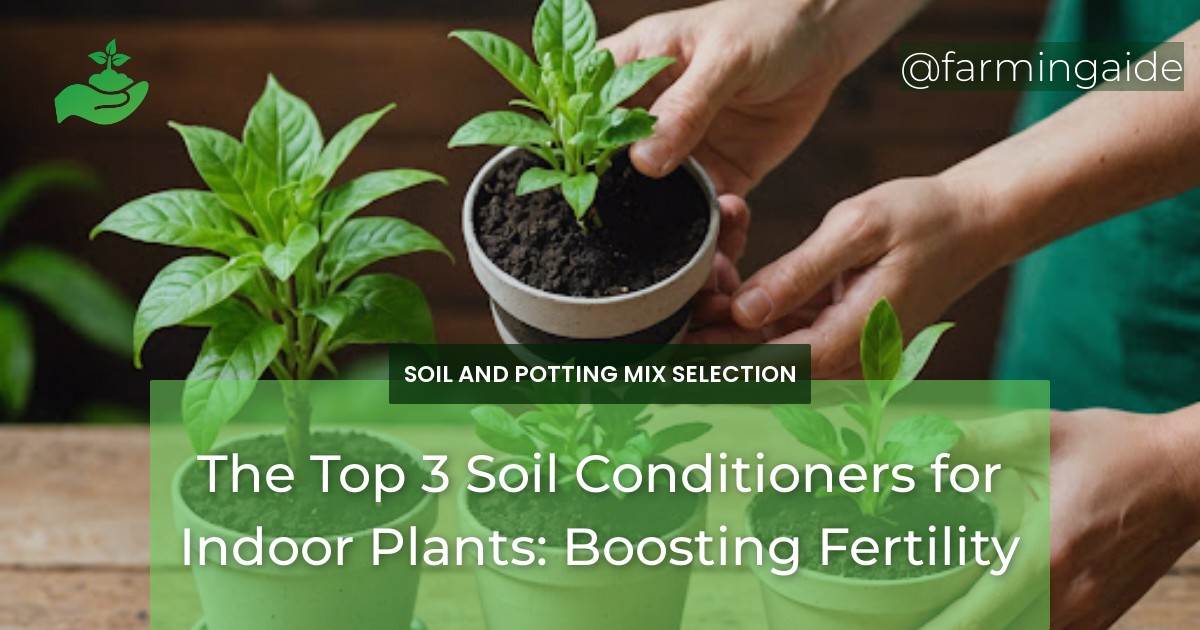Unlock the full potential of your indoor plants by discovering the top 3 soil conditioners that will boost fertility and promote healthy growth. As an indoor plant enthusiast, you’re likely aware of the importance of providing your plants with a nutritious and well-balanced soil environment. Soil conditioners play a vital role in enhancing soil structure, moisture retention, and nutrient availability, ultimately leading to thriving and vibrant plants. In this article, we’ll delve into the world of soil conditioners, exploring their definition, importance, and benefits, as well as the top 3 soil conditioners for indoor plants.
Key Takeaways
- Soil conditioners are essential for improving soil fertility and plant health.
- Vermiculite, coconut coir, and compost are the top 3 soil conditioners for indoor plants.
- Soil conditioners enhance soil structure, moisture retention, and nutrient availability.
- Using soil conditioners can lead to improved plant health, increased yields, and reduced soil erosion.
- Proper application techniques and rates are crucial for optimal results.
Understanding Soil Conditioners
Soil conditioners are amendments added to soil to improve its physical, chemical, and biological properties. They can be organic or inorganic materials that enhance soil fertility, structure, and overall health. Soil conditioners can be used to overcome soil limitations, such as poor drainage, low nutrient availability, and inadequate water-holding capacity.
Definition and Importance of Soil Conditioners
Soil conditioners are essential for maintaining healthy and productive soil. They can help to:
- Improve soil structure and aeration
- Enhance moisture retention and availability
- Provide nutrients and micronutrients
- Support beneficial microbial activity
- Mitigate soil erosion and compaction
Types of Soil Conditioners
Soil conditioners can be broadly classified into two categories: organic and inorganic. Organic soil conditioners include materials like compost, manure, and green manure, while inorganic soil conditioners consist of materials like perlite, vermiculite, and sand.
Top 3 Soil Conditioners for Indoor Plants
After researching and comparing various soil conditioners, we’ve narrowed down the top 3 soil conditioners for indoor plants. These conditioners have been selected based on their effectiveness, ease of use, and availability.
ALSO READ
Vermiculite: Enhancing Soil Structure
Vermiculite is a popular inorganic soil conditioner that improves soil structure, aeration, and water-holding capacity. It’s a natural mineral that expands when heated, creating a lightweight, porous material. Vermiculite is ideal for indoor plants that require excellent drainage and aeration, such as cacti and succulents.
Coconut Coir: Sustainable and Moisture-Retentive
Coconut coir is a sustainable, eco-friendly soil conditioner derived from coconut husks. It’s an excellent moisture-retentive material that improves soil’s water-holding capacity, reducing the need for frequent watering. Coconut coir is perfect for indoor plants that prefer high humidity and consistent moisture levels, such as ferns and peace lilies.
ALSO READ
Compost: Rich in Nutrients
Compost is a nutrient-rich organic soil conditioner that provides beneficial microbes, improves soil structure, and increases soil fertility. It’s an excellent natural fertilizer that promotes healthy plant growth and development. Compost is suitable for a wide range of indoor plants, including vegetables, fruits, and flowers.
How to Use Soil Conditioners
Using soil conditioners effectively requires understanding the application rates, techniques, and timing. Here are some general guidelines to get you started:
Mixing Soil Conditioners with Potting Mix
When mixing soil conditioners with potting mix, start with a ratio of 1 part conditioner to 2 parts potting mix. This will help you achieve the desired balance of properties. You can adjust the ratio based on the specific needs of your plants and the type of conditioner used.
Application Rates and Techniques
Application rates vary depending on the type of soil conditioner and the specific needs of your plants. As a general rule, start with a small amount (about 10-15% of the total potting mix) and gradually increase as needed. You can also incorporate soil conditioners into your potting mix during repotting or use them as a top dressing for established plants.
Benefits of Using Soil Conditioners
Soil conditioners offer numerous benefits that can transform the health and productivity of your indoor plants.
Improved Plant Health
Soil conditioners improve soil fertility, structure, and moisture retention, leading to healthier and more resilient plants. This, in turn, reduces the risk of pests, diseases, and nutrient deficiencies.
Enhanced Soil Properties
Soil conditioners can improve soil’s water-holding capacity, aeration, and drainage, making it an ideal environment for plant growth. This leads to stronger root development, better nutrient uptake, and increased yields.
Conclusion and Final Thoughts
In conclusion, the top 3 soil conditioners for indoor plants – vermiculite, coconut coir, and compost – offer a range of benefits that can elevate the health and productivity of your plants. By understanding the importance of soil conditioners, choosing the right type, and applying them correctly, you can create a thriving indoor garden that brings joy and beauty to your space.
Recap of Benefits
Soil conditioners can:
- Improve soil structure and fertility
- Enhance moisture retention and availability
- Provide nutrients and micronutrients
- Support beneficial microbial activity
- Mitigate soil erosion and compaction
Encouragement to Try Soil Conditioners
Don’t be hesitant to try out these top 3 soil conditioners for indoor plants. With their numerous benefits and ease of use, you can take your indoor gardening to the next level. Experiment with different combinations and ratios to find the perfect blend for your plants. Happy gardening!


